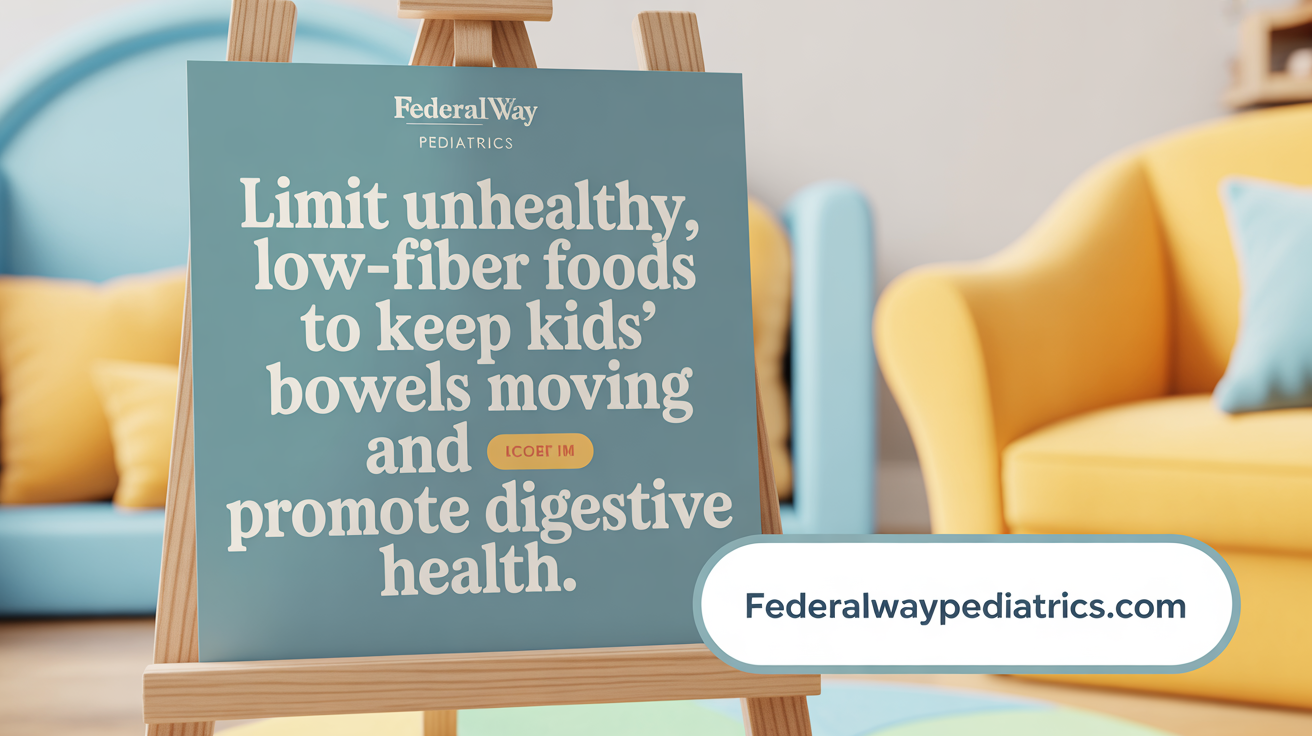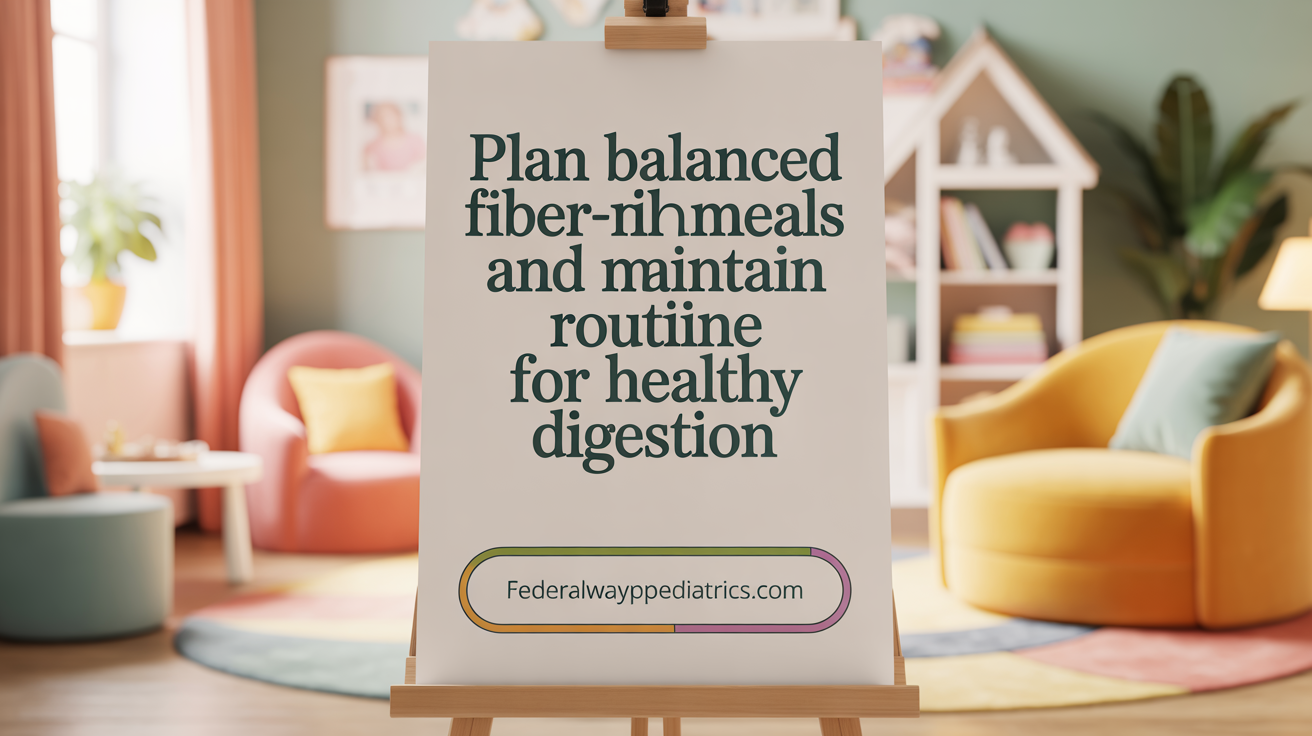Understanding Fiber and Its Role in Children's Digestive Health
Constipation is a common concern in children, affecting their comfort and overall well-being. One of the most effective ways to prevent and alleviate constipation is through dietary fiber, which helps make stools softer and easier to pass. This article explores the significance of fiber in children's diets, highlights high-fiber foods suitable for young palates, discusses dietary strategies for increasing fiber intake, and provides practical tips for meal planning to ensure regular bowel movements and healthy digestion.
What Are High-Fiber Foods Suitable for Children with Constipation?

What are high-fiber foods suitable for children with constipation?
High-fiber foods are essential in preventing and relieving constipation in children. They help form soft, bulky stools that are easier to pass. Suitable foods include a variety of whole grains such as whole wheat bread, oatmeal, and whole-wheat pasta. Incorporating legumes like lentils, black beans, chickpeas, and edamame can also significantly increase fiber intake.
Fruits play a vital role, especially berries, apples with skin, pears with skin, oranges, and dried fruits like raisins. These fruits provide important fiber along with other nutrients. Vegetables such as carrots, broccoli, sweet potatoes, and peas are excellent sources, contributing to overall digestive health.
Snacks high in fiber, such as popcorn (without excessive butter or sugar), ground flaxseed, and avocados, can be easily added to daily meals or eaten alone to support bowel regularity.
Differences between soluble and insoluble fiber and their food sources
Soluble fiber dissolves in water to form a gel-like substance that softens stool and helps lower cholesterol. It is found in oats, beans, certain fruits like strawberries, and vegetables such as peas.
Insoluble fiber remains mostly intact during digestion, adding bulk to stool and speeding up transit through the gut. Foods rich in insoluble fiber include whole grains, apple skins, corn, nuts, popcorn, and dried fruits.
Both types of fiber are important for maintaining healthy digestion and should be included in a balanced diet.
Importance of gradual fiber introduction and hydration
When increasing fiber intake, it is crucial to do so gradually. Sudden high fiber consumption can lead to bloating, gas, and discomfort.
Children should also increase their fluid intake—mainly water—to help fiber do its job effectively. Proper hydration ensures that stools stay soft and pass smoothly.
Encouraging a mix of fiber-rich foods along with adequate liquids promotes healthy bowel movements and reduces the risk of constipation. Regular physical activity and establishing a consistent bathroom routine further support digestive health.
By thoughtfully combining these dietary and lifestyle approaches, parents can help children develop healthy habits that prevent and alleviate constipation effectively.
Understanding Fiber Types and Their Benefits in Preventing Constipation
What foods are high in fiber to prevent constipation?
Incorporating foods rich in fiber is a practical approach to keeping the digestive system healthy and preventing constipation. High-fiber foods can be classified into those containing soluble fiber and those with insoluble fiber, both of which have distinct but complementary roles.
Soluble fiber is found in foods like oats, apples, bananas, avocados, and barley. These foods form a gel-like substance in the digestive tract, which softens stool and makes it easier to pass. For example, a cup of raspberries provides about 8 grams of fiber, while a medium baked potato offers nearly 4 grams. Eating fruits such as pears (with skin), pears nectar, and prunes, which are high in soluble fiber and sorbitol, can help stimulate bowel movements.
Insoluble fiber remains mostly intact through the digestive process, adding bulk to stool and speeding up its passage. Good sources include whole wheat bread, pasta, nuts, seeds, and vegetables like carrots, broccoli, and potatoes with skins. For instance, a serving of whole-wheat pasta contains about 6 grams of fiber, and an apple with skin adds additional insoluble fiber.
Combining these foods ensures both gel formation and bulking effects, promoting regularity and preventing constipation. Alongside fiber intake, staying well-hydrated is essential since water helps fiber do its job effectively. Drinking plenty of liquids, such as water, fruit juices, and clear soups, supports stool softness.
Including a variety of fiber-rich foods like beans, lentils, vegetables, fruits, and whole grains in daily meals provides the necessary nutrients for normal bowel movements. For children, it’s especially important to encourage the consumption of fruits with skins, vegetables, and fiber-enriched cereals, combined with adequate fluid intake, to develop healthy bowel habits.
Dietary Strategies to Naturally Relieve Constipation in Children

What dietary strategies can help relieve constipation naturally in children?
Managing childhood constipation often starts with diet. One of the most effective approaches is increasing the consumption of high-fiber foods. Fruits like pears (especially with skin), apples, berries, and kiwis, along with vegetables such as carrots, broccoli, and green peas, are excellent sources of soluble and insoluble fiber. Incorporating whole grains—like oatmeal, whole wheat bread, and brown rice—also adds necessary fiber.
Legumes such as beans, lentils, and chickpeas can be added to meals in soups, stews, or salads for a fiber boost. Nuts and seeds, including ground flaxseed and chia seeds, are beneficial snacks or toppings that enhance fiber intake. Natural laxatives like prune and pear juices, when given in moderation, can stimulate bowel movements due to their sorbitol content.
Adequate hydration plays a critical role. Children should drink enough fluids daily—roughly half their body weight in ounces—using water, low-fat milk, and natural fruit juices. Beverages like prune, apricot, or pear juice can be particularly helpful. Additionally, magnesium-rich foods such as avocados, spinach, and dark chocolate help relax intestinal muscles, easing passage.
A diet that combines high fiber, proper hydration, and healthy fats encourages normal bowel movements. Regular physical activity further supports digestion. Establishing a consistent toilet routine and gentle abdominal massages can also help children develop healthy habits.
In some cases, if dietary measures are not enough, consulting a healthcare provider is recommended. They may suggest natural remedies like Epsom salt baths or specific dietary adjustments to effectively manage constipation.
Foods to Avoid for Preventing or Relieving Constipation in Children
 When it comes to preventing or alleviating constipation in children, dietary choices play a crucial role. Certain foods can slow down digestion or worsen existing symptoms, so it's important to be mindful of what children eat.
When it comes to preventing or alleviating constipation in children, dietary choices play a crucial role. Certain foods can slow down digestion or worsen existing symptoms, so it's important to be mindful of what children eat.
Foods that are low in fiber and high in fat, sugar, or processed ingredients should be avoided. These include fast foods, chips, processed snacks, and refined grains like white bread and white rice. Such foods tend to be greasy and heavy, which can delay intestinal transit and make bowel movements more difficult.
Excessive dairy products, such as large amounts of cheese, whole milk, and other high-fat dairy items, can also contribute to constipation in some children, especially if consumed in large quantities. Limiting items like ice cream and creamy desserts is advisable.
Moreover, foods with little to no fiber, like applesauce, candy, and sugary drinks including sodas and fruit-flavored beverages, should be minimized. These foods don't support bowel health and can displace more nutritious, fiber-rich options.
Replacing unhealthy snacks with fiber-rich alternatives can make a significant difference. Offer children whole grain bread, cereals with at least 5 grams of fiber per serving, fruits with skins like apples and pears, vegetables, nuts, seeds, and dried fruits like prunes and apricots. Encouraging water intake alongside these foods helps keep stools soft and promotes regularity.
In summary, the goal is to limit processed, high-fat, and sugary foods while emphasizing natural, high-fiber options. These dietary adjustments, combined with adequate hydration and physical activity, are effective strategies for preventing and relieving constipation in children.
For more detailed tips and recipes, search using the query "foods to avoid for constipation in children." Remember, gradual dietary changes and consistent habits are important for maintaining healthy bowel movements.
Effective Meal Planning Tips for Managing Constipation in Children

What are effective meal planning tips for managing constipation in children?
Managing constipation in children through diet involves thoughtful planning and making strategic food choices. Incorporating more high-fiber foods is a cornerstone of effective meal planning. This includes adding whole grains like oats, brown rice, and whole wheat bread, which provide soluble and insoluble fiber crucial for stool softening and bulk. Including a variety of fruits, particularly dried fruits such as prunes and raisins, and fresh options like pears with skin and berries can boost fiber intake significantly.
Vegetables play an essential role as well. Well-cooked carrots, broccoli, peas, and leafy greens are excellent sources of both types of fiber and help promote healthy digestion. Pairing these fiber-rich foods with plenty of water and diluted fruit juices supports softer stools and easier bowel movements. It’s important to establish regular eating and drinking routines—serving meals at consistent times and encouraging children to drink fluids regularly throughout the day.
Limiting processed and low-fiber foods like chips, fast food, and sugary snacks is equally important since these can worsen constipation. Reducing intake of foods high in calcium, especially in excess, and avoiding food additives and excessive dairy can help prevent symptoms.
Creating a structured routine, including encouraging children to sit on the toilet consistently after meals and fostering a relaxed, positive environment during toileting, can improve gut motility. Incorporating prebiotic foods such as garlic, onions, and bananas may support beneficial gut bacteria, potentially easing constipation.
Consulting healthcare professionals for personalized dietary advice is recommended. They may suggest fiber supplements or specific dietary adjustments tailored to the child's needs. Overall, a diet that combines increased fiber, sufficient hydration, and regular habits can effectively manage and prevent constipation in children.
Additional Lifestyle and Dietary Considerations for Pediatric Constipation Prevention
Importance of physical activity and bowel habit training
Encouraging children to stay physically active is vital in preventing constipation. For children under 5 years who can walk, at least an hour of daily activity is recommended. Regular movement helps stimulate bowel movements by encouraging healthy gut motility. Additionally, establishing a routine bowel habit—such as sitting on the toilet at regular times after meals—helps train the bowel to move consistently. Creating a supportive environment and rewarding efforts rather than results can build lifelong healthy bowel habits.
Hydration guidelines for children increasing fiber intake
Adequate fluid intake is essential when increasing fiber in a child's diet. Children should drink at least 4 to 8 cups of liquids daily, mainly water, low-fat milk, or clear soups. Proper hydration helps fiber work effectively by softening stool and preventing hardness. When children consume more fiber-rich foods like fruits and vegetables, ensuring they get enough fluids is crucial to avoid worsening constipation.
Role of probiotics and when to consult healthcare providers
Probiotics such as Bifidobacteria and Lactobacilli can support gut health by promoting a healthy balance of bacteria, which may improve bowel regularity in some children. However, routine use of probiotics for constipation is not universally recommended, and it is best to consult a healthcare provider before starting supplementation. Persistent constipation or other health concerns should be evaluated by a pediatrician to determine appropriate treatments.
How fiber benefits overall gut health and fullness sensation
Dietary fiber not only helps prevent and relieve constipation by adding bulk and softening stools but also enhances feelings of fullness after meals. This can contribute to better appetite regulation and weight management. Additionally, fiber supports the gut microbiome, fostering beneficial bacteria that aid digestion and overall gut health.
Practical tips to integrate fiber-rich foods into everyday meals
Incorporating high-fiber foods can be simple and enjoyable. Serve fresh fruits like apples, pears, and berries with skins on, include vegetables such as carrots and broccoli in snacks or meals, and opt for whole grains like whole wheat bread and pasta. Legumes such as lentils, beans, and chickpeas can be added to soups, salads, or dips. Use ground flaxseed or chia seeds in cereals or smoothies for an extra fiber boost. Small, consistent changes make it easier for children to achieve recommended fiber intake and maintain healthy digestion.
Promoting Healthy Digestion Through Fiber and Lifestyle
Ensuring children consume a diet rich in fiber from a variety of sources—including fruits, vegetables, whole grains, legumes, nuts, and seeds—plays a crucial role in preventing and relieving constipation. Pairing fiber intake with adequate hydration and encouraging physical activity helps promote regular bowel movements and overall digestive health. Avoiding processed and low-fiber foods while embracing gradual dietary changes and positive toilet routines supports long-term wellness. Parents and caregivers should monitor their child’s bowel health and consult healthcare professionals if constipation persists, ensuring a proactive approach to pediatric digestive well-being.
References
- High-Fiber Food for Kids to Fight Constipation - Parents
- Eating, Diet, & Nutrition for Constipation in Children - NIDDK
- Food as Medicine: Food Therapy for Constipation
- [PDF] High Fiber Diet - Texas Children's Hospital
- Relieve Constipation in Kids | Our Blog | CHKD
- 7 Child-Friendly Foods to Prevent Constipation - CHRISTUS Health
- High Fiber Diet - Nationwide Children's Hospital
- Foods for Constipation | Johns Hopkins Medicine
